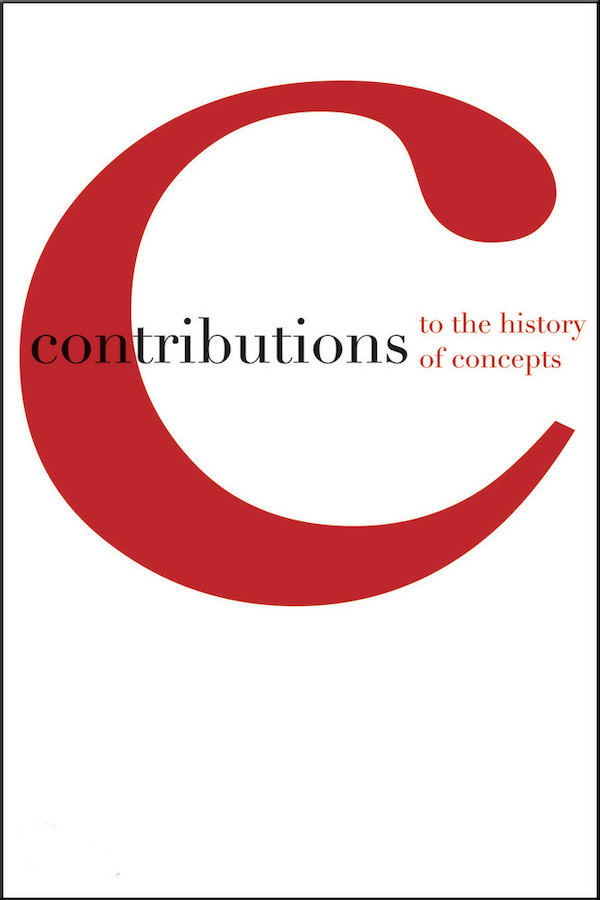
Contributions to the History of Concepts
ISSN: 1807-9326 (print) • ISSN: 1874-656X (online) • 3 issues per year
Editors: Gabriel Entin, CONICET /Universidad de Chile, Jan Ifversen, University of Aarhus, Silke Schwandt, Universität Bielefeld
Interim Editor: Frederik Schröer, Max Planck Institute of Human Development, Germany
Subjects: history of ideas, history of ideology, intellectual history, linguistics, political science, political theory
 Published on behalf of the History of Concepts Group.
Published on behalf of the History of Concepts Group.
HCG Membership includes a subscription to this journal. Members can access the journal online here.
![]() Available on JSTOR
Available on JSTOR
Follow @ConHistCon
Latest Issue
Volume 20 Issue 1
Between Memory and Image
Reinhart Koselleck's Contributions
The year 2023 marked the centenary of the birth of German historian Reinhart Koselleck whose work we wish to celebrate in this special issue. The conference “Uses and Actuality of Reinhart Koselleck's Work,” funded by the Fritz Thyssen Foundation and held that year at the Deutsches Literaturarchiv (German Literature Archive) in Marbach am Neckar, was the starting point for the articles we are publishing here. Research on Koselleck's work has undergone many variations over time, and it became clear at this conference that the emphasis placed on different themes has challenged the monopoly of conceptual history. In the past several years, new publications of great importance to Koselleckian research have appeared, including a compilation of his articles on memory under the title
Reflexive Images
Reinhart Koselleck's Heuristic Understanding of the Image as a Methodological Impulse for History
Although images are an integral part of historical research today, it is quite unusual that a historian is conceiving the image as a heuristic model instead of interpreting it in terms of representation (of an event or “its” time). In this article, I argue that in a long-term dialogue with image theory and by taking photographs of monuments and memory sites, Reinhart Koselleck discovered the image as an experimental space for thinking of historical time differently from linear narrative. Koselleck's photographs of memory sites in particular may be viewed as an invitation to explore the intricate relations between individual perception now and then, experience, memory, and its cultural (trans-)formations. Seen this way, images can provoke new questions and give impulses for methodological reflection in historical research.
Political Iconography and Historical Time
The Visual Symbolism of French Historical Painting and Portraiture and of the Caricatures of Honoré Daumier
This study investigates nonverbal iconographical signs in the sphere of political iconography, both in relation to late eighteenth- and early nineteenth-century French historical paintings and portraiture and to political caricatures published in early nineteenth-century France. After examining the visual codes mobilized by French historical painting and portraiture of the late eighteenth and early nineteenth centuries, and the temporal symbolism underlying their various modes of visual communication, I examine what I take to be the shift in visual symbolism brought about by the epoch-making caricatures of Honoré Daumier, which deployed new techniques of lithography permitting the unprecedented communication of highly charged political messages to a mass population. In elaborating this second part of my study, I draw on the iconographic theory of Reinhart Koselleck.
Under the Auspices of Mnemosyne
Reinhart Koselleck's Figure Collection and Its Disempowering Agency
This article reconsiders the relationship between experience, memory, and iconology in Reinhart Koselleck's thought from an unexpected perspective. It focuses on the lesser-known
Dreams and History
Reinhart Koselleck's Perspective
What role do dreams play in the writing of history, and how might we understand them beyond the limits of psychoanalytic interpretation? This article explores these questions by engaging with a range of interdisciplinary literature that examines the intersection between dreams, history, and philosophy. It highlights how dreams, often dismissed as purely subjective or psychological phenomena, can also serve as valuable historical sources that reflect collective experiences, social tensions, and political realities. The article then turns to the work of German historian Reinhart Koselleck, who investigated this potential through his analysis of two collections of dreams recorded during the era of National Socialism: one by Jean Cayrol and another by Charlotte Beradt. By examining Koselleck's approach, the article discusses how dreams not only relate to the historical context in which they emerge but also contribute to processes of individual and collective memory, offering a unique lens for historical inquiry.
Koselleck's Politics of Memory
The Absurd History and the Implicated Subject
This article analyzes Koselleck's views on the politics of memory and examines why, despite his valuable insights, these have had little impact on memory studies. After reviewing his contributions to the German debate, an attempt to reconstruct his notion of memory is made. It is then suggested that such a notion is limited by Koselleck's focusing on his own personal primary experiences and on the German case, as well as by the fact that he considers only victims and perpetrators. Nevertheless, at the same time, such limitations contain important potentialities. Koselleck's position as both a witness and historian, his advocation for wordless, negative aesthetics as a response to the absurdity of history and his insistence on the differentiation of victims are akin to proposals regarding multidirectional memory and the implicated subject.
The Making of Memory
Monumental Iconology as Historical Semiotics by Reinhart Koselleck
In the space of a generation, the image has become the main and omnipresent medium through which we relate to the world, shaping our modes of expression and our experiences. This mutation has brought about a profound renewal of our practices and a significant change in our relationship to time—with a narrowing focus on actuality—but also to memory, with the possibility through images to instantly disseminate singular experiences in the public sphere. Starting from the untransmissible nature of individual experiences, particularly traumatic ones, Koselleck offers us the outline and starting point for a rethinking of these contemporary transformations, particularly regarding the question of transmission, but also access to a common memory, which leads us to rethink the very presuppositions of historical work.